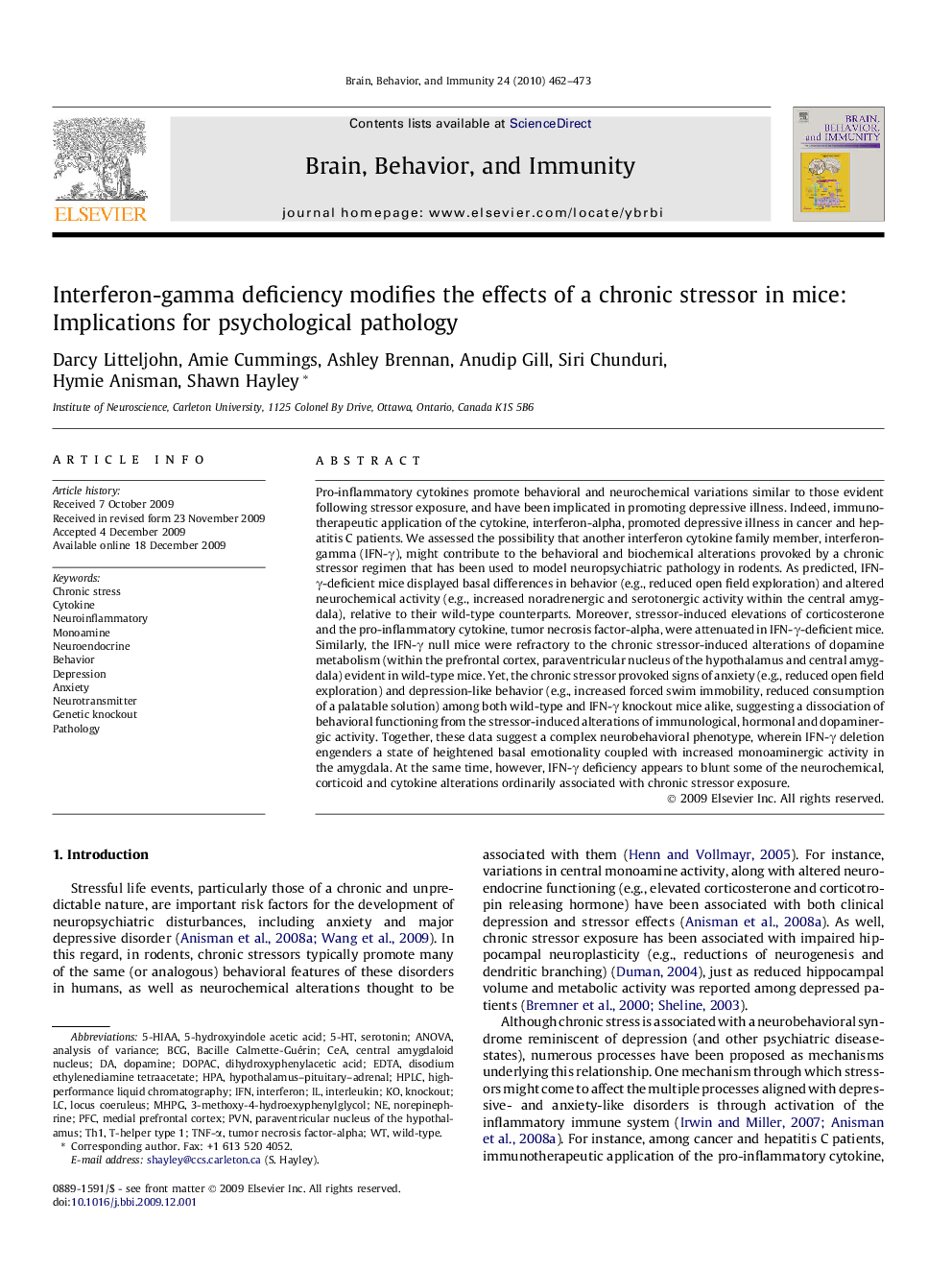| Article ID | Journal | Published Year | Pages | File Type |
|---|---|---|---|---|
| 10455031 | Brain, Behavior, and Immunity | 2010 | 12 Pages |
Abstract
Pro-inflammatory cytokines promote behavioral and neurochemical variations similar to those evident following stressor exposure, and have been implicated in promoting depressive illness. Indeed, immunotherapeutic application of the cytokine, interferon-alpha, promoted depressive illness in cancer and hepatitis C patients. We assessed the possibility that another interferon cytokine family member, interferon-gamma (IFN-γ), might contribute to the behavioral and biochemical alterations provoked by a chronic stressor regimen that has been used to model neuropsychiatric pathology in rodents. As predicted, IFN-γ-deficient mice displayed basal differences in behavior (e.g., reduced open field exploration) and altered neurochemical activity (e.g., increased noradrenergic and serotonergic activity within the central amygdala), relative to their wild-type counterparts. Moreover, stressor-induced elevations of corticosterone and the pro-inflammatory cytokine, tumor necrosis factor-alpha, were attenuated in IFN-γ-deficient mice. Similarly, the IFN-γ null mice were refractory to the chronic stressor-induced alterations of dopamine metabolism (within the prefrontal cortex, paraventricular nucleus of the hypothalamus and central amygdala) evident in wild-type mice. Yet, the chronic stressor provoked signs of anxiety (e.g., reduced open field exploration) and depression-like behavior (e.g., increased forced swim immobility, reduced consumption of a palatable solution) among both wild-type and IFN-γ knockout mice alike, suggesting a dissociation of behavioral functioning from the stressor-induced alterations of immunological, hormonal and dopaminergic activity. Together, these data suggest a complex neurobehavioral phenotype, wherein IFN-γ deletion engenders a state of heightened basal emotionality coupled with increased monoaminergic activity in the amygdala. At the same time, however, IFN-γ deficiency appears to blunt some of the neurochemical, corticoid and cytokine alterations ordinarily associated with chronic stressor exposure.
Keywords
DOPAC5-HTGenetic knockoutMHPGTh15-HIAAPFCBCG5-hydroxyindole acetic acidCeAEDTAChronic stressAnxietyDepressioninterferonIFNinterleukinBacille Calmette-Guérinanalysis of varianceANOVAtumor necrosis factor-alphaDopaminedisodium ethylenediamine tetraacetatedihydroxyphenylacetic acidBehaviorSerotoninCytokineNeuroinflammatoryneuroendocrineTNF-αmedial prefrontal cortexlocus coeruleusPVNMonoamineHPAknockoutnorepinephrineT-helper type 1wild-typecentral amygdaloid nucleusparaventricular nucleus of the hypothalamushypothalamus–pituitary–adrenalPathologyNeurotransmitterHPLChigh-performance liquid chromatography
Related Topics
Life Sciences
Immunology and Microbiology
Immunology
Authors
Darcy Litteljohn, Amie Cummings, Ashley Brennan, Anudip Gill, Siri Chunduri, Hymie Anisman, Shawn Hayley,
